ATLANTA
February 14, 2020
STRANGER: Adrian
LOCATION: The Vortex, 878 Peachtree Street NE, Atlanta
THEME: A queer black content creator talks about finding his audience online
Speaking his mind is Adrian’s full-time profession.
The engaging millennial has gained more than 76,400 YouTube subscribers and almost 32,000 Twitter followers embracing the wide range of online content he creates: videos talking about pop culture and news of the day, writing his first album, self-publishing a gay fantasy novel, recording podcasts, and more.
Although the work pays his bills, his primary motivation isn’t money. Rather, it’s to reassure LGBTQ people who might be in the closet that they’re not alone
Growing up queer in a religious household in a small town made him feel isolated. By building a world of queer online content he hopes to reach people in similar situations. “I want to create a community for people who are like me or feel like they are but don’t have a voice,” Adrian tells me as we meet for dinner.
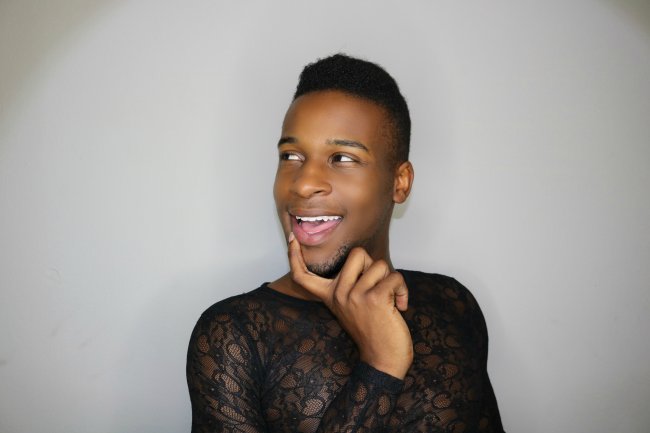
I’m in Atlanta for the extended President’s Day weekend and a long-scheduled interview with Adrian. At his suggestion we’re having dinner at The Vortex, a funky bar and restaurant downtown where the line for tables stretches out the door. The eye-catching interior features blood-red walls and eclectic decorations — there’s a chandelier made from (hopefully) fake human skulls. Adrian tells me he likes the food and the fun vibe of the place, which looks like a dive bar that’s swallowed an American diner.
Adrian is still discovering new places to eat and drink in Atlanta after moving there roughly two years ago. Most of the time you won’t find him out and about but instead in his apartment working on his lengthy list of creative projects.
He’s constantly uploading to Twitter, Facebook, Instagram, YouTube, Tumblr, and his own website. It sounds exhausting. How much of his time does it consume?
“A lot,” he says. There’s very little down time (our Friday night meal filled a rare spot in his calendar) and when he’s not writing or editing or recording, then he’s reading articles online to stay informed and generate ideas for future projects.
To pick the topics he talks or writes about he’ll browse social media and news websites to see which stories are gaining attention, and focus on the ones that he personally cares about. “And that’s challenging because sometimes there are stories that are huge that I just don’t care about,” he confides. “I could hop on and talk about it because it’s a big story, but it would lack authenticity and I feel people would be able to see that.”
His posts tend to cover his opinions on topics as diverse as politics, pop culture, sexuality, Donald Trump, and drag queens (to name a non-exhaustive few). For example Adrian’s January 3 update — with more than 15,000 views — covers “The Privilege of Americans, Coachella, DaBaby, Netflix + Tyler Perry, Democratic Race,” all with plenty of humor and thoughtful insight.
“[T]here’s a line between talking about pop culture and being that annoying asshole that is trying to get into people’s business. There are certain lines I won’t cross, like really digging into people’s personal lives. I want to talk about how people think and the things they say and how that affects different communities, instead of petty gossip,” he adds, then laughs. “But I’ll focus on the gossip sometimes.”
Adrian’s a genuine pleasure to watch. Online he’s incredibly talkative, considerate, quick to laugh and joke, and able to bounce across a host of conversational topics with thoughtful comments. He’s exactly the same in person.
I ask what he tells people who ask what he does for a living. “I usually say I’m a content creator or I run some online platforms. I keep it very simple, and if they’re interested and ask more than I’ll tell them what I talk about,” he replies, then adds that “maybe I can be an annoying social justice warrior sometimes, but my main goal is to create a safe space, a community for people who are like me, or feel like they are different and that they don’t have a voice.”
We pause as our meal arrives. We’ve both selected from Vortex’s long burger menu.
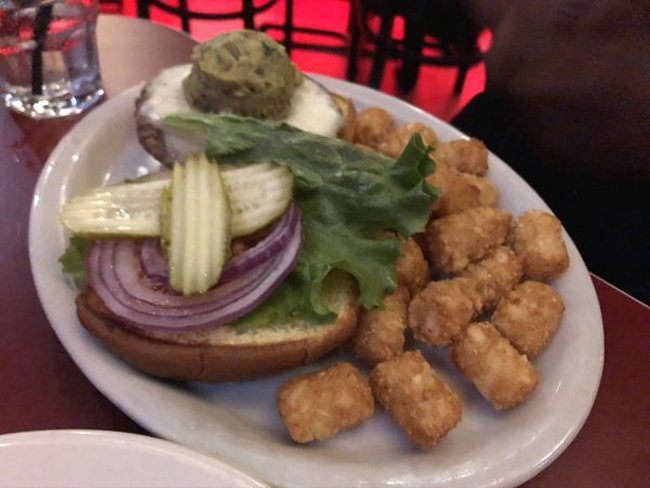
Adrian is having the Holy Guacamole: a meatless Impossible Burger patty topped with jack cheese and a huge serving of house-made freshly made guacamole.
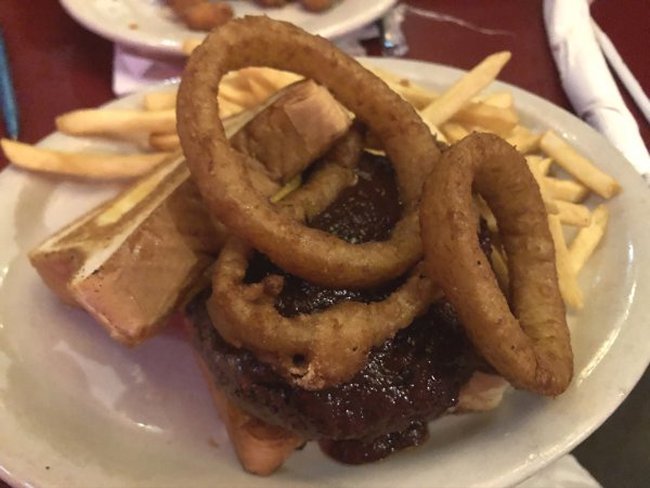
I’m eating the Lone Star Tex Melt: a regular burger topped with cheddar cheese, spicy honey BBQ sauce, and crispy onion rings, served on Texas toast.
The food’s great. Not exactly fine dining, but a fantastic combination of robust flavors and huge portions.
While eating, we chat about our personal histories. I tell him about growing up in England. He talks about his early life in the United States.
The content that Adrian (his preferred mononym; he has a surname, but it’s irrelevant) produces is precisely the kind of media he wished he had when growing up gay in South Florida. “I was the only black kid at school, and one of the only gay ones. I had to pick my friends wisely,” he says, reiterating his loneliness as a child.
“My family is super-duper religious, so being gay was definitely not approved,” he says. “I couldn’t be myself at church or school so the internet was my thing.”
At high school he had a television production class where he learned people could get paid for doing YouTube videos, and he starting making them at home. One of his first videos was about his school’s International Baccalaureate program. Then he started to share his thoughts on pop culture. And then politics. And so on, making it up (successfully) as he went along.
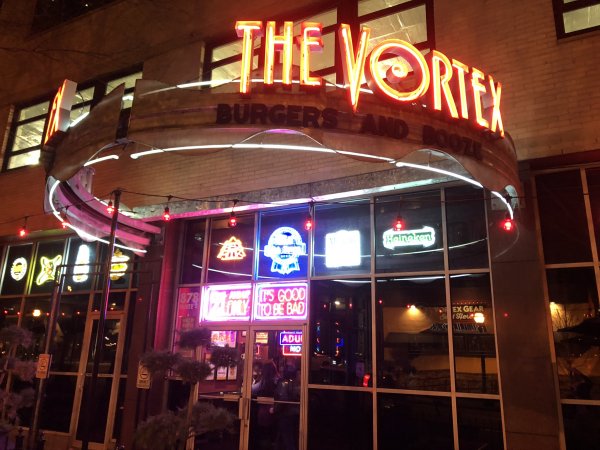
Age 18 he left home for Florida State University, getting a bachelor’s in sociology on after ditching a planned commercial music degree. “I went in there thinking it was going to train me to be a performer or some shit, but it was more technology-based so I ditched it,” he says with a laugh. “I took sociology and ending up loving it, and now I talk about how society’s structured all the time. I’ve had to be a good observer to avoid bullshit in my upbringing, I would see certain things and not know the names for them, and sociology kind of gave me a framework to put names to things that I had been noticing about how the world works, how the country works, how society works.”
I ask for an example and he offers up the concept of one’s chances in life being based off how much power they have. “A straight white guy with a whole lot of money would have more life chances; he would have the most access to success, a healthy life, a happy life Someone who’s way on the other end of privilege like a trans black woman has more difficulties in life,” he says. “When you explain it, it seems like common sense, but that’s what sociology did — it gave me names to put to things.”
After graduating, Adrian got his master’s in professional communication, because he didn’t know how he would be able to get a well-paying job with his sociology degree. Communications was perfect because “I like talking, I like running my mouth, I like branding and marketing. But I hated the math,” he says with an eye roll.
Adrian was enticed to move to Atlanta by the chance to live among artistic black gay people. His YouTube career was already successful enough to be his main income. The revenue comes from the advertisements attached to the videos, but he shies away from receiving money for brand endorsements. “I can’t advertise a product that I’m not using. I don’t want to be a sellout,” he explains, then laughs, “But the money would be nice.”
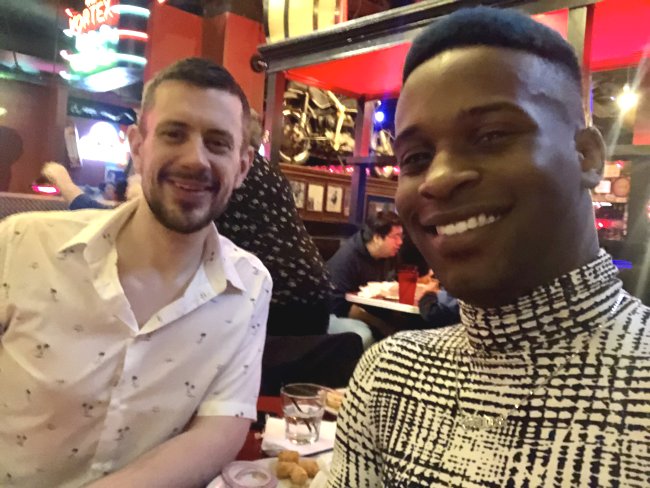
In addition to advertising revenue on his YouTube videos, Adrian makes money from sales of his novel, donations via subscriptions to his Patreon platform, and more. “It’s not like I’m rolling around in money, but I’m paying my bills,” Adrian says.
Being self-employed, he has devised a schedule for working on his videos on Mondays, Wednesdays, and Fridays, while Tuesdays and Thursdays are reserved for his other work such as podcasts that people can subscribe to via Patreon. “My life is on an unofficial schedule, it’s basically organized chaos,” he tells me.
Adrian admits that researching, writing, performing for his videos and podcasts every week can get exhausting. “But I tell myself that everyone gets exhausted at work, and if this is what I want to do then I have to just be resilient. There are times though when my anxiety is buckling me, it can be disorienting. But it helps so much when people tell me, ‘Oh my gosh your videos helped me and because of you I was able to do this or that’,” he says with a warm smile. “And that makes it worth it to me.”
For a long time Adrian’s videos would open with him saying, “I’m librarian and I came to read,” launching the reader into his takes on the world that often came with a hefty amount of shade for some of the people and things he discusses. But as he’s gotten older, Adrian says he’s evolving to an approach based less on dragging people. “Cause you can call shit out and be funny but at the end of the day what are you trying to say?”
Will he still be making commentary videos at 50 or older? “I don’t know, I don’t know, I don’t know,” he says as he thinks in silence for a moment. “I want to be self-sufficient like I am right now, but have this make even more financial sense.”
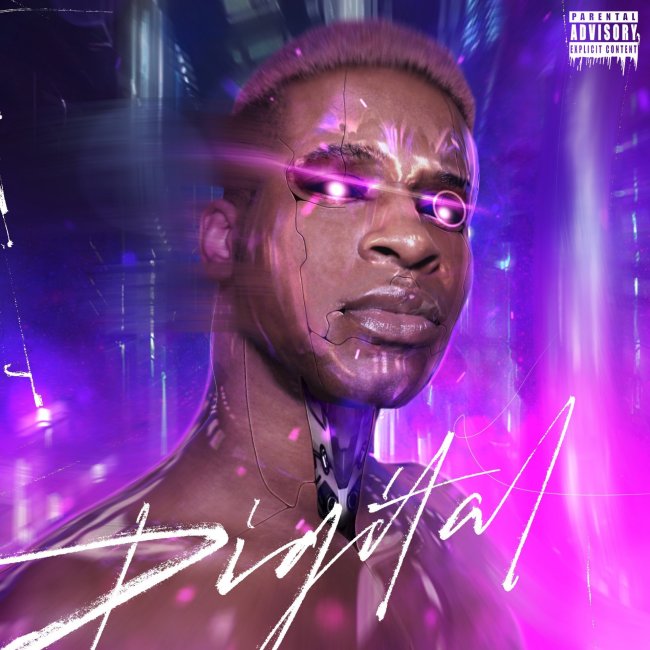
And he’s interested in branching out to new creative fields, including his imminent album “Digital” that includes four songs. He finally gets to create music all these years after starting and then dropping the musical degree at university.
Adrian also self-published “Xeraxia: Wrath of the God King,” a gay fantasy novel, inspired by his love of the genre. “I saw Game of Thrones and I wanted to see a version that has gay and black people in it as the primary characters,” he tells me.
“And I thought, fuck it, I’m going to make it on my own. And it was difficult and took a long time to write, and even now I know there’s so many things I could have done better, but I’m so proud of myself for finishing it,” he says, adding this he is “very slowly” writing the sequel, and at the time of our dinner had completed the first chapter.
Other projects he’s interested in are panel discussions and forums where he can share the stage with other queer creative people. “I like doing those more because I get to bounce ideas off people and we have a conservation as opposed to ‘I’m Adrian!’”
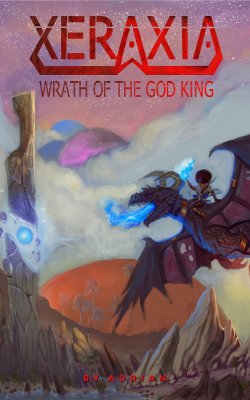
A consistent aspect of Adrian’s work is that he’s always seen his primary audience as informed queer people. “And I say queer both in the sense of LGBT sexuality, but also queer as in they’re just different, they can see above the clouds.”
I’m curious whether Adrian’s move to college and Atlanta was a way to help himself embrace the life he always wanted, free of his religious family. “I will say it was one of the reasons I chose to leave for school,” he says.
“But I love, love, love my mother. It was just tricky to really understand where she was coming from and also to hold on to my personality and individuality at the same time as having a relationship, at that time, with the adults in my life,” he adds, then erupts in his infectious laugh again. “I’m sure my mom avoids everything online with me.”
“Hopefully your family will evolve,” I say.
“That’s their journey,” he replies, with no spite. “I remember a patron wrote me and told me about how his mom knows he’s gay but still makes snide comments. I told him your journey to accept yourself has already been done. If she wants to be that way that’s her prerogative. It’s unfortunate but you have to protect your piece of mind.”
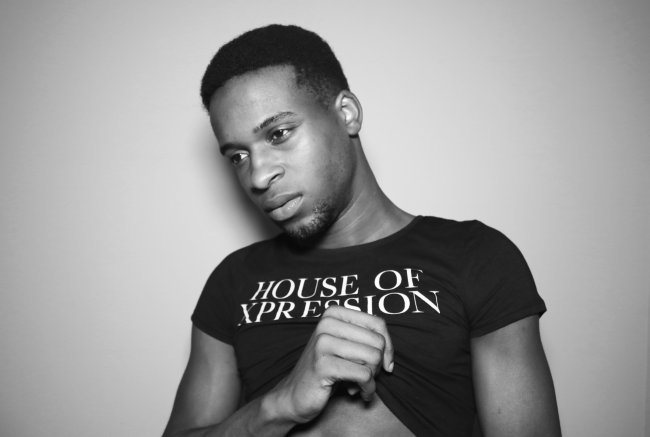
Although Adrian’s profession is all about putting his face and words out to the public, he still aims to maintain some privacy. And he also understands that for any future potential employers there’s a massive database of his words and videos online, meaning they could inform an opinion about him before they ever meet.
“It’s always something to consider, but I hope that the people who want to work with me in the future, our energy will be aligned, our mission will be aligned, so much that the database will be something advantageous. I probably wouldn’t even want to work in any area or for any company that considers my portfolio disadvantageous to whatever they’re trying to do,” he says proudly. “I want to walk in there with them already knowing that that is out there and it is interesting.”
He adds, “I will say it’s difficult because when you’re young and on YouTube and on social media you do it from a different mindset than now, because I’m growing — but I’m growing in front of people and that can be very nerve wracking. It’s hard to balance, because I feel like people who really like you, they want to see your life. But I just know the value of having yourself to yourself, so I need some privacy.”
With dinner ending, I’ve got just enough time to ask about whether the cost of being so public and the hours involved are worth the end result.
He nods and smiles. “My main goal is to create a safe space, a community for people who are like me or feel like they don’t have a voice, that’s really the aim. When I was younger I felt so alone and the internet was one of the only places I could go to feel like a normal person,” he says. “So I wanted to give back because I know there are people who are in the same situation I was in, and if I can help someone like that while also doing something I like then to me it’s a no-brainer.”